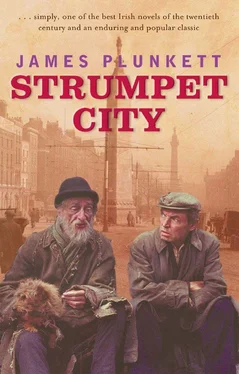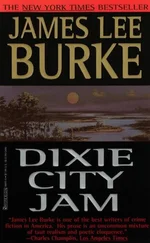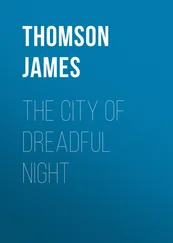She kissed him in sudden abandon, his lips, his cheeks, his forehead, finding them cold and soaked with rain. Then she began to cry.
‘Tell me what has happened.’
She told him. For the first time in many days she found love offered to her in place of hostility. Under a dark tree, in the wind and the rain of a December midnight, there was the feeling of home. She had been exiled from that for longer than she could bear. She clutched him desperately and said: ‘What am I to do?’
He held her for a moment in silence. Then in a voice which was unexpectedly calm and firm he said: ‘You mustn’t go home.’
‘No.’
‘Because if you do they’ll keep you there. We might never see one another again.’
‘Where else can I go?’
‘You can stay with the Farrells and I can find some other place for a while.’
‘Will they agree?’
‘Of course they’ll agree.’
She had never had a problem of any importance to put to him before. His assurance was a new quality at which to marvel.
‘You can stay there until we can arrange to be married.’
‘I’ll do it,’ she said, ‘but how?’
‘Give me just a little time to arrange it,’ he said, ‘I’ll leave word for you and when I do all you’ll have to do is walk out as you did tonight.’
‘What about my father?’
‘You can write to him to tell him you’re safe. We’ll be married before they can do anything about it.’
She said: ‘It all seems simple now when you are with me. But when you’re not here I’m going to be afraid.’
‘Don’t you want to come with me?’
‘How can you ask?’
‘Then there’s nothing to be afraid of. From the moment you leave here I’ll be with you.’
The leaves above them shook furiously and the dislodged drops soaked both of them. Mary shivered and said: ‘I must go. They might miss me.’
‘I’ll send word,’ he said.
‘Tell me you love me.’
‘I love you.’
‘Think of me later and say it too.’
‘I’ll say it all the way home,’ he answered.
He waited until she had gone into the house and the candlelight showed in her window. Then he went off. She thought of him battling his way back to the city, his head down against the rain. His confidence had reassured her. The future no longer filled her with dread and uncertainty.
In the first days of the New Year Mary left the Bradshaws’ home for ever. She met Fitz once again in the garden and closed the gate quietly, this time from the outside. She had a small case of belongings and sixteen pounds, the fortune she had managed to save. They walked all the way to the city, a journey which took over two hours. When they reached the Farrells’ house Mrs. Farrell was waiting with tea for them. She asked no questions.
The next day Fitz moved to a room elsewhere and Mary wrote two letters. The one to her father assured him that she was safe and that he must not worry about her. The one to Mrs. Bradshaw found the house in chaos for want of servants, a troublesome situation which continued for a couple of weeks, when suitable new recruits were eventually found. Miss Gilchrist’s partial paralysis remained, until in the end Mr. Bradshaw made up his mind. Her removal to the workhouse upset Mrs. Bradshaw for several months.
CHAPTER FIVE
Winter was always the worst time in that city. In autumn the trees along suburban roads were venerable but elegant; in winter they were gnarled and ragged ancients, with rheumatic knuckles and bones. The large houses became draughty and hard to heat; the young children on their way to Miss Tieler’s ballet and dancing class in Molesworth Hall wore gaiters over thick stockings and top-coats over jerseys and shawls, so that when they alighted from trams and cabs they were recognisable because of their enormous size. In the mornings just at the breakfast hour the poor searched diligently in the ashbins of the well-to-do for half-burnt cinders and carried sacks and cans so that as much as possible of the fuel might be salvaged. The ashbin children were pinched and wiry and usually barefooted. They lived on the cast-offs. They came each morning from the crowded rooms in the cast-off houses of the Rich; elegant Georgian buildings which had grown old and had been discarded. The clothes they wore had been cast off by their parents, who had bought them as cast-offs in the second-hand shops in Little Mary Street or Winetavern Street. If the well-to-do had stopped casting off for even a little while the children would have gone homeless and fireless and naked. But nobody really thought about that. These things Were.
It was a bad time for the carters, rising by candlelight, shivering on their way to work before six o’clock, wondering would there be ice on the streets to keep the horses in the stables. And for the building trade, where every other day the weather became ugly and there was broken time. The dockers hated winter. They huddled in groups on the quayside and waited through interminable mornings for ships that had been delayed.
It was a bad time all round. The east wind beat in from the sea and drove under the arches of the river, so that when the gulls rose with a cry from the water it hurled them backwards in a high, swift curve. The Farrells’ house, where Mary continued to stay, quivered often at night because of the great beating of the sea. She had grown used to its sound while with the Bradshaws, but here it was nearer and more violent. Frequently, when she walked along the front in the mornings, she found the beach strewn with driftwood and debris. After a while she began to join others in collecting what could be used for fuel. At times, when she sat listening to the sea and the wind, her thoughts turned to the house in Kingstown and she wondered if Mrs. Bradshaw still complained of the draughts from the folding doors.
On one of the bleakest nights the great coal-stack in the foundry went on fire. Fitz, who was on duty, was called out a little after midnight by Carrington the foreman. At first there were no flames and the smoke could not be seen in the pitch darkness. But both recognised the smell, a particular odour which left a thick taste on the tongue. They traced it to the lower yard, after much uncertain groping and guessing. The smoke was heavy in the yard and hit them so suddenly that they both swallowed it and coughed. From the darkness beside Fitz, Carrington’s voice said: ‘It’s the coal-stack.’
It had happened before. Carrington, wondering if he should put the emergency routine into operation, hesitated.
‘I wonder how bad it is?’
‘We won’t know until we disturb it,’ Fitz said, ‘and when we do that it may be too late.’
‘I’ll see about getting the brigade,’ Carrington decided. ‘Take out enough of the furnace crew to rig up the lighting set and see about mustering extra help.’
A little later the city, huddled behind drenched housefronts, stirred to hear the clangour of bells in the empty streets. As the first engine swung into the yard the men were already moving the lighting set into position. A cloud of smoke, bent at an angle by the wind, showed up blackly.
‘Why the hell wouldn’t it happen in summer,’ one of the men said.
They had shovels ready and were crouching in the meagre shelter of the lamp supports. Sleet slanted intermittently, a curtain between the darkness and the lamps. The brigade men were in position with hoses ready.
The foreman had some words with the chief before he ordered the labourers forward. They dug gingerly, testing for the source of the fire and leaving small mounds of coal about the main stack. After a while one of the men, digging deeper than the rest, sprang aside and called out. A small tongue of flame licked upwards. Carrington said to Fitz:
Читать дальше












